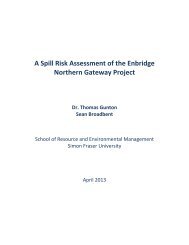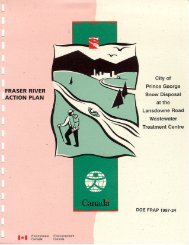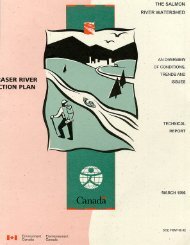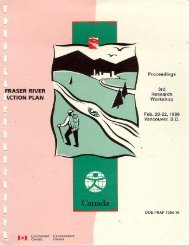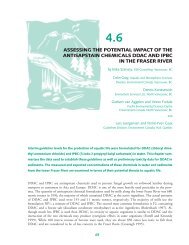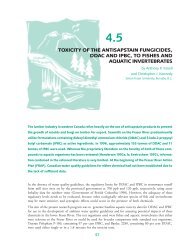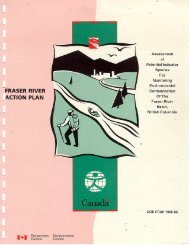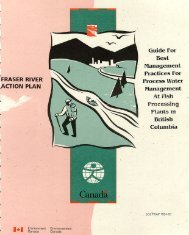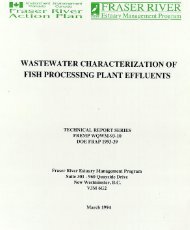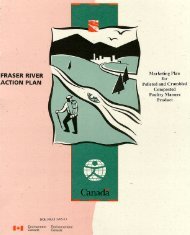Livestock Waste Management Practices And Legilation Outside Br
Livestock Waste Management Practices And Legilation Outside Br
Livestock Waste Management Practices And Legilation Outside Br
You also want an ePaper? Increase the reach of your titles
YUMPU automatically turns print PDFs into web optimized ePapers that Google loves.
2. INTRODUCTION TO LIVESTOCK WASTE MANAGEMENT<br />
PROBLEMS AND PRACTICES IN OTHER JURISDICTIONS<br />
3<br />
The BC Ministry of Environment, Lands and Parks (BCMELP), Environment<br />
Canada, Fisheries and Oceans and BC Ministry of Agriculture, Fisheries and<br />
Food have jointly undertaken an initiative to assess Agricultural <strong>Waste</strong><br />
<strong>Management</strong> in the Lower Fraser valley. The broad objectives of this initiative<br />
are to evaluate the production, management and use of agricultural wastes, and<br />
then to utilize this information in developing strategies for improving nutrient<br />
(manure and inorganic fertilizer) management.<br />
These objectives are consistent with the needs of Environment Canada's Fraser<br />
River Action Plan whose broad goals include reducing the loading of<br />
agriculturally related chemicals and wastes to the environment.<br />
This report is one in a series of projects in the Fraser Valley Agricultural <strong>Waste</strong><br />
<strong>Management</strong> program. The objective of this project is to identify livestock waste<br />
management practices and legislation outside of <strong>Br</strong>itish Columbia.<br />
No matter what part of Europe, Canada or the United States one might choose<br />
to examine, the underlying public concern associated with manure and manure<br />
management is pollution and potential pollution.<br />
Recent patterns of concentrated intensive livestock operations, profitability of<br />
large scale livestock production and agricultural policies have all contributed to<br />
the increased production of manures. As a result, large quantities of manure<br />
have been applied to a limited land area often without considering the potential<br />
hazards. The threat of pollution in all its forms, affects and potential affects is<br />
prevalent where these large quantities of livestock waste are produced.<br />
Concerns with potential pollution of air, water, habitat and soil resources<br />
resulting from livestock manure management is a key public policy concern in<br />
many countries. Most emphasis appears to be on water pollution and a focus of<br />
concern is on the decreasing quality of drinking water. However, European<br />
countries seem most willing to acknowledge the range of complex issues<br />
associated and attempt to address the problems in a constructive fashion.



